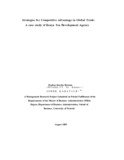| dc.contributor.author | Ratemo, Pauline K | |
| dc.date.accessioned | 2013-05-16T08:11:27Z | |
| dc.date.available | 2013-05-16T08:11:27Z | |
| dc.date.issued | 2009 | |
| dc.identifier.citation | Masters of business administration | en |
| dc.identifier.uri | http://erepository.uonbi.ac.ke:8080/xmlui/handle/123456789/23512 | |
| dc.description.abstract | This paper analyzed the challenges faced when trading tea globally and the competitive
advantages that a major player, KTDA, could employ in the global trade. Kenya being an
agricultural country needs to sustain agricultural development for economic growth. A lot of the
income for small scale holders comes from trading tea. Therefore improved sales can lead to
improved lifestyles for the farmers. A country's Gross Domestic Product will also improve
leading to overall economic development.
The research method involved a case study of KTDA and the findings were analyzed using
content analysis to determine the current challenges faced when trading with tea globally and the
competitive advantages KTDA was employing in view of this. Previous studies had shown
weaknesses in the management and organizational structure of the company leading to a
suboptimum performance in global trade.
The respondents consisted of managers who were interviewed and the information collected
from them was checked for accuracy and completeness and then analyzed to arrive at the various
conclusions.
The study concluded that the competitive advantages that KTDA entails in its management
include quality enhancement and product differentiation strategies. The objective is to maintain
an edge over its competitors and also sustain a position as the global market leader.
The findings from this analysis are a guide for policy recommendations and suggested strategies
will improve the tea sector and the overall economic development in Kenya, and hence aid in the
attainment of vision 2030 given that Kenya is an agriculturally inclined country in terms of
production for export. The agricultural sector consists of four major sub-sectors namely
industrial crops, food crops, horticulture, and livestock and fisheries. Tea falls under the food
crops sub-sector and is a major contributor to export earnings. | en |
| dc.description.sponsorship | University of Nairobi | en |
| dc.language.iso | en | en |
| dc.title | Strategies for competitive advantage in global Trade: A case study of Kenya Tea Development Agency | en |
| dc.type | Thesis | en |
| local.publisher | School of business,University of Nairobi | en |

